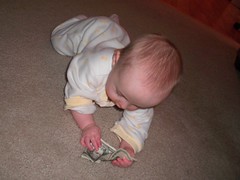My 30 Day Project for April is to declutter my entire house. That’s every room, every dresser, every drawer. We’ve got 12 years of jointly accumulated clutter.
Our progress so far has been wonderful. The main level of our house is almost done.
In our daughters’ room, we put in bunk beds and pulled out a dresser. With the crib, changing table, and toddler bed removed, they actually have room to play on the floor. Their closet has been emptied and repurposed as scrapbooking and blanket storage. Cost: $140 for the bunk beds.
Our son’s room has had a dresser, a desk, and a bed replaced with a loft bed. Even with the 6 foot tall monstrosity of a bed, his room looks so much bigger. We still have to clean out his closet, which is mostly artifacts of a business we no longer have, leftovers from when his bedroom was our office. Cost: $260 for the loft bed.
Our room was depressing. Never dirty, but oh-so-full. The closet was jam-packed. The top shelf was full of towels and sheets. The closet rod couldn’t fit another shirt. There was a modular shelving system on the floor of the closet–full. We had three full dressers. The headboard has 5 foot tall cabinets, half of which were full of makeup and jewelry, the other half with books. Now, there is 1 empty dresser. It belonged to my great-grandmother, so it’s going to the shop to be refinished, instead of the garage sale to be sold. Another dresser has spare room in it. There’s no need to rearrange the cabinets to get to anything. The closet is less than half full and there is almost nothing on the floor of the closet. Gear for my side-line business is stored out of sight and out of the way. This is so much more relaxing.
We’ve tackled the kitchen, except for 1 cabinet, which is mostly cookbooks and booze. That will be fun to clean out.
Our front closet was worthless. It was so full we put hooks on the outside of the door to hang our coats. We pulled out a dozen coats we never wear. At least 20 pairs of shoes, some belonging to roommates gone 1o years. We can actually use the closet now. The shoes and boots all have homes. Our coats all fit…inside.
We have 1 closet and 1 cabinet left to address on the main level. There are also 3 small rooms in the basement that need to be gutted–the laundry room, the family room, and a room that has been designated for storage and the litter box. The last one will be the hardest. It’s full of remnants of hobbies past and failed ventures. I’m expecting some fights, flowing every possible direction.
In the process, we’ve filled our dining room with stuff for our garage sale…twice. It’s all getting priced and boxed as we go through it. We thrown away anything we won’t be able to sell. We’ve done all of this with the mutual understanding that nothing is coming back in the house. After the sale, it will be donated or sold on Craigslist, but it won’t become a part of our lives again. We are successfully purging so much. The “skinny clothes” are gone. When the time comes, they’ll be replaced. In the meantime, they can be put to better use on someone else. Hobbies that never took, games that are never played, it’s all going. We are getting down to the things that are actually used and useful.
It’s interesting to note that the process is getting easier as the month goes by. My Mother-in-Law is a hoarder. Those habits get passed down, but what was originally a source of stress has turned into a pleasant chore.
The most wonderful discovery of all? It turns out we don’t need a better storage system, we just need less stuff.
Update: This post has been included in the Money Hacks Carnival.








